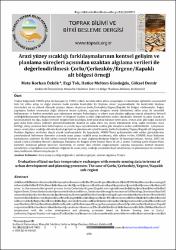ATATÜRK İLKELERİ VE İNKILÂP TARİHİ DERSİ'NİN UZAKTAN EĞİTİM ŞEKLİNDE VERİLMESİNİN ÜNİVERSİTE ÖĞRENCİLERİNİN GÖRÜŞLERİ AÇISINDAN DEĞERLENDİRİLMESİ (KIRKLARELİ ÜNİVERSİTESİ ÖRNEĞİ)
Abstract
Bu araştırmanın amacı, Atatürk İlkeleri ve İnkılâp Tarihi dersini uzaktan eğitim olarak alan üniversite öğrencilerinin bu dersin uzaktan eğitim şeklinde veriliyor olmasına ilişkin görüşlerini tespit etmektir. Araştırmada veri toplama aracı olarak kullanılan anketler, 2015-2016 eğitimöğretim yılı bahar döneminde Kırklareli Üniversitesi'nde öğrenime devam eden ve Atatürk İlkeleri ve İnkılâp Tarihi dersini uzaktan eğitim şeklinde alan öğrencilerden toplam 2781 öğrenciye uygulanmıştır. Toplanan verilerin analizi için IBM SPSS Statistics 20 programından yararlanılmıştır. Toplanan verilere ait tanımlayıcı istatistikler ayrıntılı olarak verilmiştir. Yapılan bağımsız örneklem t-testi ve varyans analizleri sonucunda "cinsiyet"e, "öğretime devam edilen birim"e ve "sürekli kullanılabilecek internet bağlantısının varlığı"na göre öğrencilerin Atatürk İlkeleri ve İnkılâp Tarihi dersinin uzaktan eğitim olarak verilmesine yönelik tutum düzeylerinin istatistiksel olarak anlamlı farklılık gösterdiği tespit edilmiştir (p<0,05) The aim of this research is to determine the university students’ opinion related to teaching the Atatürk’s Principles and History of Revolution course with distance education. Here, the students whose opinions were used, were the students who took this course with distance education. In this research, the questionnaires, which were used as data collection tool, were conducted to 2781 students who were students during the spring term of 2015-2016 academic year in Kırklareli University and who took the Atatürk’s Principles and History of Revolution course with distance education. IBM SPSS Statistics 20 Program has been used to analyze the collected data. Descriptive statistics of the collected data were given in detail. Also, it was found that attitude scores toward teaching the Atatürk’s Principles and History of Revolution course with distance education were statistically differed based on "gender", “department”, and “existence of internet connectivity which can be used consistently” after performing independent samples t-test and One-Way ANOVA (p<0,05)



















